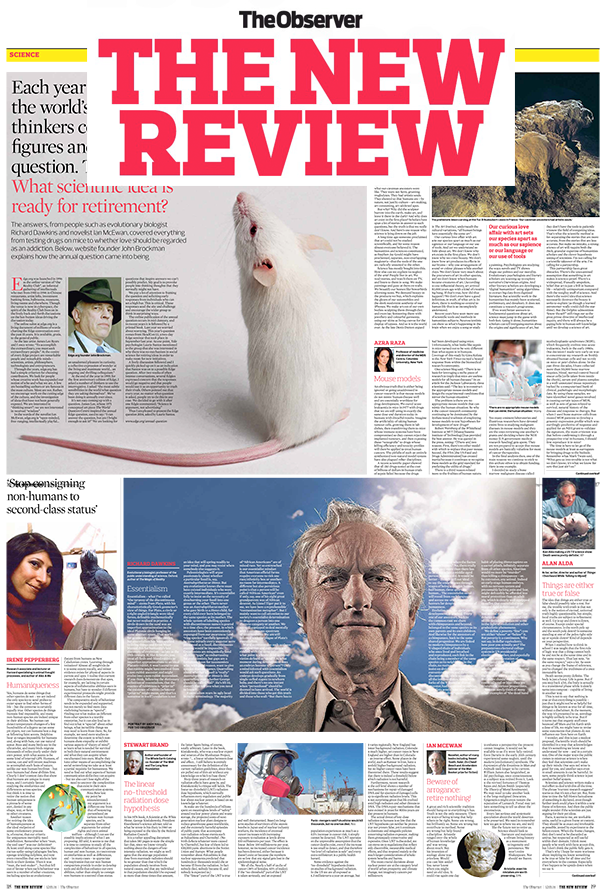Edge in the News: 2014

Be imaginative, exciting, compelling, inspiring: That's what John Brockman expects of himself and others. Arguably, the planet's most important literary agent, Brockman brings its cyber elite together in his Internet salon "Edge." We paid a visit to the man from the Third Culture.

At the age of three John Brockman announced: "I want to go to New York!" For decades he has been a leading light behind the scenes in the city's intellectual life. Foto wowe
...Like the idea of the Internet—which was slowly acquiring contours during these rambling 1960s discussions—the idea of Edge, the Internet salon around which Brockman's life now revolves, was also taking shape. Edge is the meeting place for the cyber elite, the most illustrious minds who are shaping the emergence of the latest developments in the natural and social sciences, whether they be digital, genetic, psychological, cosmological or neurological. Digerati from the computer universe of Silicon Valley aren't alone in giving voice to their ideas in Brockman's salon. They are joined in equal measure by other eminent experts, including the evolutionary biologists Richard Dawkins and Steven Pinker, the philosopher Daniel Dennett, the cosmologist Martin Rees, the biological anthropologist Helen Fisher, the economist, psychologist and Nobel Prize winner Daniel Kahneman, the quantum physicist David Deutsch, the computer scientist Marvin Minsky, and the social theorist Anthony Giddens. Ranging from the co-founder of Apple Steve Wozniak to the decoder of genomes Craig Venter, his guest list is almost unparalleled even in the boundless realm of the Internet. Even the actor Alan Alda and writer Ian McEwan can be found in his forum.
The bridge of the third culture
A question is sent out to all salon members at the start of every year. This year it is: "What scientific idea ready to be retired?" The "editorial marching orders," written by Brockman, reveal the heart of Edge: "Go deeper than the news. Tell me something I don't know. You are writing for your fellow Edgies, a sophisticated bunch, and not the general public. Stick to ideas, theories, systems of thought, disciplines, not people. Come up with something new, be exciting, inspiring, compelling. Tell us a great story. Amaze, delight, surprise us!" ...
[Continue using Safari/Firefox/Internet Explorer] [Continue using Chrome][
NOTE: Chrome auto-translate re-translates the English version on the FAZ webstie into a machine language translation.]
Pre-Publication Serialization

"The online salon at edge.org is a living document of millions of words charting the Edge conversation over the past 15 years. It is available, gratis, to the general public.
"As the late artist James Lee Byars and I once wrote: 'To accomplish the extraordinary, you must seek extraordinary people.' At the centre of every Edge project are remarkable people and remarkable minds—scientists, artists, philosophers, technologists and entrepreneurs."

Pre-Publication Serialization:

Every year, the American literary agent John Brockman asks the Cyber-Elite year the Edge question. Read a selection of the most exciting and surprising answers.

I recommend Edge.org where the best brains in the world comes together to talk to each other and let us listen. Do not miss their conversations. Very interesting video about encapsulated universes Lera Boroditsky. According to her, the 7,000 languages in the world create parallel universes based on different conceptions of their customs and history.
According to Lera, is likely to set the language we speak the way we think.

In the 90s, John Brockman sought to promote a range of activities and meetings to set the "third culture" that spoke CP Snow in his book The Two Cultures, back in the '60s, in which he expressed his hopes for a new culture to cover the gap between scientists and intellectuals. Since then, it has been developing and expanding group of researchers looking for the meeting of disciplines.
But, as said Brockman and against what one might expect, the bridges towards a comprehensive knowledge and integrity are not being stretched from shore humanistic as Snow thought, but from the scientific side. Here that which humanists discuss enclose themselves and then complain that the world suffers from "scientistic" is true, but do not do anything about it, much less to offer reasons to defend the claim that Brockman, against intellectual inbreeding of academic humanists, closed in themselves and in defense of ideas alien to all empiricism, scientists are more open:
Maybe their egos are so colossal as the iconic representatives of the academic humanities, but his way of dealing with that hubris is very different.Anytime an argument can sift, because they work in an empirical world of facts, reality-based world.They have fixed, immovable stances, they are both creators and critics of the company held in common. Ideas come from them, and it is they who call into question the respective ideas. Through the process of creativity, criticism and debate, decide which ideas must be eradicated and which become part of the consensus that leads to the next level of discovery. Unlike the humanities academicians who speak about about others, scientists speak of the universe.
(Brockman, The New Humanism )

If you're a consumer of various types and genres of media like me, we're probably thinking along the same lines - enough with the Best Of 2013 lists already! I've decided to take the opposite approach this week and look ahead at some of the books our staff and sales reps are most excited about for the first part of 2014. I've already read some, the rest are waiting in my to-read pile. Here's what we'll be reading:
What Should We Be Worried About? ed. by John Brockman.
The next installment in the groundbreaking science series by the founder of Edge.org. (February)


